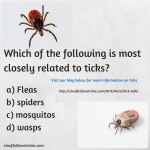The most common tick in Ontario is the American Dog Tick, another common tick in Ontario is the Black Legged Deer Tick 
Quick Facts
- The Deer Tick is much smaller than the Dog Tick
- Only the Deer Tick transmits Lyme Disease in Ontario
- An unfed adult tick is only 2.5mm in size
- After sucking the blood of a host, they can be up to 8mm in size
An adult tick can survive for months without eating and will even survive an Ontario winter. The adult female tick must suck blood before it can lay eggs. Starting in April and May ticks are coming out of the environment (usually tall grass) to attach to their host (dog, deer, human). After they eggs hatch in the environment the larva or nymphs will attach to mice or birds (mainly migratory song birds and wild turkey). Migrating birds transmit the ‘baby’ ticks sometimes complete with Lyme Disease to different parts of Ontario.
Hotspots in Ontario for Lyme Disease: The Lake Erie and Napanee areas
Lyme Disease in Stouffville: Last year at the Stouffville Veterinary Clinic we had seven positive cases of Lyme Disease. None of these dogs had been to the Lake Erie or Napanee areas, Lyme Disease is in Stouffville and the surrounding area too. Lyme Disease can be dormant in dogs or humans for up to 3 years! As many as 95% of infected humans will get symptoms early, such as joint pain, fever, kidney problems and heart problems. However as little as 5% of infected dogs will show symptoms early in the disease process, so it is important to detect and treat it early.
Prevention and Treatment: If you walk your dog in forested or long grassy areas, you should closely examine your dogs coat and skin for what may look like a grey wart, checking them over a few times a week. *Remember when they first attach they are very tiny (like the size of a poppy seed) but after eating will swell and look like a small grey wart.
- If you walk your dog in a forested or long grassy area, your dog should have some sort of tick prevention: there are now non toxic effective products available to prevent ticks
- There are accurate blood tests available to detect Lyme Disease
- Provided the pet is diagnosed early there is a very safe and effective treatment
- Talk to one of the Veterinarians at Stouffville Veterinary Clinic to see which product is best for your pet
For more information, check out this page on our website https://stouffvillevetclinic.com/?p=1428
Written by: Paul Westermann DVM

Fleas